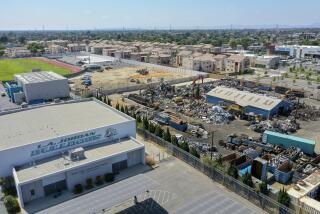6 Plead Not Guilty in Mine Cancers Case
- Share via
MISSOULA, Mont. — Six senior employees of W.R. Grace & Co. pleaded not guilty in federal court Tuesday to charges that they conspired for decades to hide the health dangers posed by asbestos-laced vermiculite mined by the company near Libby.
The company and seven top executives are named in a 10-count indictment which accused them of intentionally keeping secret numerous studies spelling out the risk cancer-causing tremolite asbestos posed to its customers, employees and Libby residents.
Arraigned Tuesday were former mine manager Alan Stringer, and corporate executives Henry Eschenbach, Jack Wolter, Robert Bettacchi, Mario Favorito and Robert Walsh.
A seventh defendant, former mine manager William McCaig, will be arraigned March 8. His lawyer asked for a delay because of a scheduling conflict.
Charges include conspiracy, violating the Clean Air Act, wire fraud and obstruction of justice.
Sisters Helen McMillan Zak and Judy McMillan Shelmerdine, who both have asbestos disease after growing up in Libby, attended the arraignment before U.S. Magistrate Judge Bart Erickson.
“I just wanted to see their faces,” said Zak, of Stevensville, breathing with the aid of an oxygen tank.
Three of the women’s four brothers have died of asbestos disease, as did their father, who worked at the Libby mine.
Stringer’s attorney, Angelo Calfo of Seattle, issued a statement after the arraignment saying the indictment “falsely portrays the facts.”
“Alan is innocent and will prove so at trial,” Calfo said.
Erickson agreed with a prosecution request that the men surrender their passports as a condition of their release.
A trial date has not been set.
Asbestos contamination in Libby came to light in 1999 after national news reports first linked the pollution from a nearby vermiculite mine to the deaths and illnesses of area residents.
The vermiculite ore was used in a number of household products, most notably a common home insulation. The ore, however, contained naturally occurring tremolite asbestos, a carcinogen.
More to Read
Sign up for Essential California
The most important California stories and recommendations in your inbox every morning.
You may occasionally receive promotional content from the Los Angeles Times.













